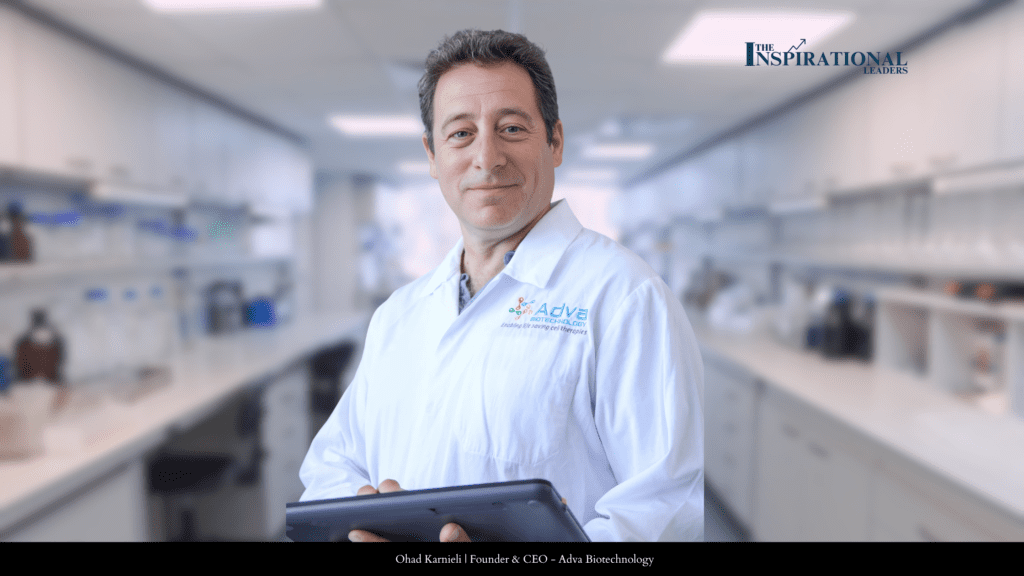Ohad Karnieli, Founder and CEO of Adva Biotechnology, stands out as a visionary leader driving progress in the fast-paced field of cell and gene therapy. With nearly two decades of experience in the field before founding Adva in 2016, Karnieli embarked on a mission to address some of the most pressing challenges within the space: the scalability, affordability, and accessibility of life-saving cell therapies. His journey, rooted in scientific exploration and driven by a passion to bridge the gap between groundbreaking research and real-world application, offers profound insight into the next chapter of healthcare.
A Vision Born from Experience and Purpose
The genesis of Adva Biotechnology can be traced back to 2016, a time when T-cell therapies—particularly CAR T—began demonstrating significant clinical success. Karnieli, having spent nearly twenty years immersed in the field of cell and gene therapy, recognized the emerging bottleneck that was threatening to hinder the industry’s growth: manufacturing.
“The science had been there for years, but it was the clinical evidence that began bringing these therapies into the spotlight,” Karnieli reflects. “Yet, it became evident that the challenge would not lie in the science alone, but in the ability to manufacture these therapies at scale and at a cost that could make them widely accessible.”
While Karnieli’s academic roots lie in stem cell research—having completed a doctorate focused on mesenchymal stem cells—he quickly realized that technological innovation was essential to transform scientific discoveries into commercially viable treatments. This realization became the cornerstone for establishing Adva Biotechnology, with a clear mission to develop scalable and affordable manufacturing solutions that maintain exceptional standards of safety and quality.
The Core Mission: Better Cells for More Patients
At the heart of Adva Biotechnology is a clear and powerful mission: to develop tools that deliver better cells to more patients. This mission is not merely a statement of intent but a deeply embedded philosophy that influences every facet of the company’s work.
Unlike many in the industry who have sought to replicate manual processes through automation, Adva’s approach begins at the biological level. “We continuously consider what conditions are most favorable for the cells.” Karnieli explains. From there, the company reverse engineers its systems, ensuring that engineering decisions serve the biological and clinical requirements first.
This patient-centric and biology-first philosophy sets Adva apart in an industry often focused on adapting existing workflows rather than reimagining them entirely. The result is a top-down innovation model that prioritizes the health and function of the cells, ensures compliance with GMP and quality standards, and ultimately redefines how cell therapies are produced.
Revolutionizing the Manufacturing Landscape
Adva Biotechnology’s technology stack represents a trifecta of innovation that addresses the key limitations in conventional manufacturing systems: environmental control, mechanical stress on cells, and adaptive data intelligence.
Firstly, the company has achieved unprecedented control over the cell culture environment, integrating fourteen parameters to monitor and adjust the conditions under which cells are grown. Adva’s patented CAMP® technology (Continuous Adaptive Multiparameter control strategy) replicates the body’s natural ability to maintain internal balance by continuously adjusting and regulating multiple parameters simultaneously. Just as the body adjusts oxygen and glucose levels during physical exertion, Adva’s system adapts in real time to cellular needs, ensuring optimal growth conditions.
Secondly, Adva has engineered a patented low-shear flow mechanism that ensures uniform media distribution without applying stress to the cells. This design innovation enables a tenfold increase in cell density compared to traditional bioreactors, significantly enhancing spatial and fluid efficiency while reducing manufacturing costs.
The third pillar of Adva’s innovation lies in its advanced data analytics. Through the use of artificial intelligence and machine learning, the system analyzes inputs from the various sensors in real time, optimizing performance and improving the quality and predictability of the cell products. This data-driven adaptability is critical for maintaining consistency across batches and for supporting the development of future therapies.
In addition, Adva’s open-architecture system design empowers therapy developers to extract more granular insights from their manufacturing processes, fostering a feedback loop that connects laboratory performance directly to clinical outcomes. This ability to dynamically adjust and optimize each step based on real-time data is a game-changer for companies aiming to bring more sophisticated, tailored therapies to market.
These elements together do more than just make the process more efficient. They represent a holistic shift in how the biotech industry can approach cell therapy manufacturing—making it more scalable, more cost-effective, and, most importantly, more focused on patient outcomes.
Overcoming Industry Barriers with Data and Determination
Despite its groundbreaking advancements, Adva Biotechnology faces a common hurdle in highly technical and regulated industries: resistance to change.
“There is a legitimate hesitancy among scientists to adopt radically new manufacturing processes,” Karnieli notes. “Cells are incredibly sensitive, and the fear of disrupting a working protocol is understandable.”
To address this, Adva invests heavily in generating robust data, both independently and through collaborations with scientific partners. This data-driven approach helps to de-risk the adoption of new technologies, offering transparent evidence that demonstrates consistency, safety, and quality.
Moreover, Adva promotes the adoption of continuous improvement models within therapy developers’ internal teams. By presenting tangible improvements in cell yield, purity, and cost-effectiveness, the company is helping change the narrative around manufacturing transformation.
The Power of Collaboration in a Complex Ecosystem
Adva’s growth and impact have been accelerated through strategic partnerships and global networks. Karnieli recognizes that solving the multifaceted challenges of cell therapy delivery requires a diverse range of expertise—technological, scientific, regulatory, and financial.
“The only way to effectively bring these therapies to patients is through collective effort,” he emphasizes. “Collaboration is not optional; it is essential.”
These alliances enable knowledge-sharing, rigorous validation of technology, and broader access to Adva’s platforms. By building a collaborative ecosystem, Adva is helping to align stakeholders around a shared mission: making advanced therapies accessible to all who need them.
Strategic partnerships with pharmaceutical leaders, research institutions, and biotech innovators provide validation and scalability for Adva’s platform while encouraging data-sharing protocols that enrich the broader scientific community.
Leadership Anchored in Purpose and People
As a leader in a highly specialized and fast-moving field, Karnieli believes that innovation begins with people. His leadership philosophy centers around shared purpose, creative freedom, and a strong belief in the collective potential of his team.
“If people believe in what they are doing and feel appreciated, the outcomes are always good,” he says. “Innovation is a mindset that thrives on curiosity, collaboration, and the willingness to try and fail.”
Karnieli fosters an organizational culture where data-driven decision-making coexists with a patient-centric mission. He values interdisciplinary collaboration, bringing together expertise across biology, engineering, and business to solve complex challenges in holistic ways. This integrative approach, supported by transparent communication and continuous learning, has been key to Adva’s success.
Shaping the Future of Cell and Gene Therapy
Looking ahead, Karnieli envisions a healthcare landscape transformed by decentralized, personalized, and data-integrated manufacturing systems.
“In the next five years, we will see more in-hospital manufacturing,” he predicts. “Therapies will be increasingly tailored to individual patients, and automation will be critical to ensuring precision, consistency, and affordability.”
Adva Biotechnology is poised to play a central role in this transformation. With advanced remote control and data integration capabilities, Adva’s platforms support decentralized manufacturing while maintaining GMP-compliant standards. This enables hospitals and clinics to produce therapies on-site, reducing logistical barriers and accelerating time-to-treatment.
Moreover, the company’s CAMP technology exemplifies the power of data-driven decision-making in a regulatory environment, offering both flexibility and compliance. By embedding artificial intelligence into every stage of the manufacturing process, Adva is redefining the standard for how therapies are developed, produced, and delivered.
Adva’s forward-looking strategy positions it to not only respond to but actively shape regulatory, clinical, and economic trends in personalized medicine. By democratizing access to manufacturing tools, the company is unlocking the potential for smaller hospitals and treatment centers to enter the field, further decentralizing innovation.
The Role of Automation and Closed Systems
Closed-system manufacturing is one of the most critical components in the success of personalized therapies. It ensures sterility, reduces the risk of contamination, and streamlines production by minimizing manual interventions.
Adva’s innovations in this area provide a blueprint for how closed systems can not only safeguard product integrity but also enhance operational efficiency and reproducibility. In an industry where each patient may receive a unique therapy, the ability to maintain consistent quality at scale is nothing short of essential.
A Platform Built with Patient Needs in Mind
Though Adva does not treat patients directly, its technology is designed with patients at the center. By equipping therapy developers and pharmaceutical companies with tools to manufacture cells for therapy, collect and analyze manufacturing data, Adva enables more informed decision-making that can ultimately improve patient outcomes.
Its open architecture and machine learning capabilities allow for continuous optimization, bridging the gap between clinical insights and manufacturing execution. This feedback loop supports therapy developers in refining their approaches based on real-world data and patient responses.
This level of responsiveness to clinical trends allows therapy developers to continually improve their protocols and align more closely with emerging healthcare delivery models focused on patient-specific results.
Guiding the Next Generation of Innovators
For aspiring scientists and entrepreneurs, Karnieli offers heartfelt advice: believe in your purpose, stay committed to your vision, and remember the lives you can impact.
“Do not give up. The challenges are real, but the opportunity to make a meaningful difference in human lives is even greater,” he says.
In a field defined by complexity and transformation, Ohad Karnieli and Adva Biotechnology stand as exemplars of purpose-driven innovation. By reimagining the way therapies are manufactured, and by placing biology, technology, and humanity at the heart of their work, they are helping to shape a future where the promise of advanced therapies is realized for patients around the world.




